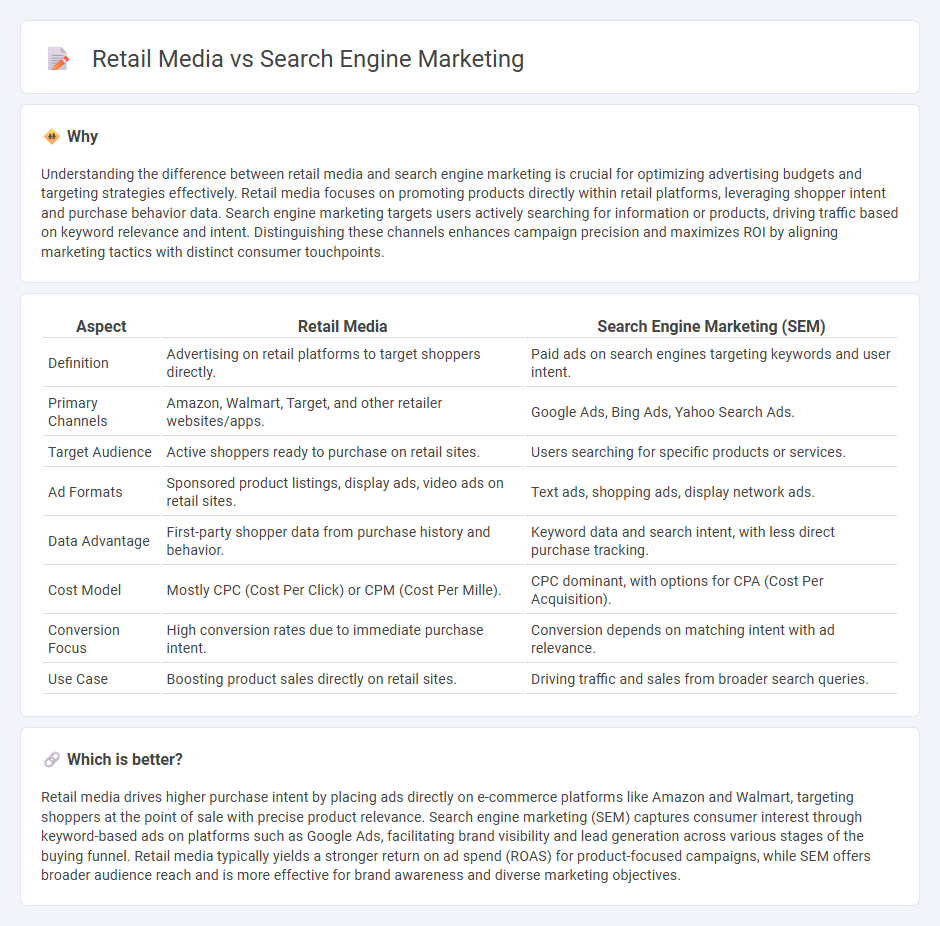
Retail media leverages e-commerce platforms and retailer websites to display targeted ads directly to shoppers during their purchase journey, enhancing conversion rates by capturing high-intent consumers. Search engine marketing (SEM) focuses on paid ads displayed on search engine result pages, driving traffic based on keyword targeting and user intent signals. Explore the benefits and strategies of retail media versus SEM to maximize your marketing ROI.
Why it is important
Understanding the difference between retail media and search engine marketing is crucial for optimizing advertising budgets and targeting strategies effectively. Retail media focuses on promoting products directly within retail platforms, leveraging shopper intent and purchase behavior data. Search engine marketing targets users actively searching for information or products, driving traffic based on keyword relevance and intent. Distinguishing these channels enhances campaign precision and maximizes ROI by aligning marketing tactics with distinct consumer touchpoints.
Comparison Table
| Aspect | Retail Media | Search Engine Marketing (SEM) |
|---|---|---|
| Definition | Advertising on retail platforms to target shoppers directly. | Paid ads on search engines targeting keywords and user intent. |
| Primary Channels | Amazon, Walmart, Target, and other retailer websites/apps. | Google Ads, Bing Ads, Yahoo Search Ads. |
| Target Audience | Active shoppers ready to purchase on retail sites. | Users searching for specific products or services. |
| Ad Formats | Sponsored product listings, display ads, video ads on retail sites. | Text ads, shopping ads, display network ads. |
| Data Advantage | First-party shopper data from purchase history and behavior. | Keyword data and search intent, with less direct purchase tracking. |
| Cost Model | Mostly CPC (Cost Per Click) or CPM (Cost Per Mille). | CPC dominant, with options for CPA (Cost Per Acquisition). |
| Conversion Focus | High conversion rates due to immediate purchase intent. | Conversion depends on matching intent with ad relevance. |
| Use Case | Boosting product sales directly on retail sites. | Driving traffic and sales from broader search queries. |
Which is better?
Retail media drives higher purchase intent by placing ads directly on e-commerce platforms like Amazon and Walmart, targeting shoppers at the point of sale with precise product relevance. Search engine marketing (SEM) captures consumer interest through keyword-based ads on platforms such as Google Ads, facilitating brand visibility and lead generation across various stages of the buying funnel. Retail media typically yields a stronger return on ad spend (ROAS) for product-focused campaigns, while SEM offers broader audience reach and is more effective for brand awareness and diverse marketing objectives.
Connection
Retail media and search engine marketing (SEM) are interconnected through their shared goal of targeting consumers at critical points of the purchasing journey using data-driven advertising strategies. Retail media leverages on-site retail data to deliver personalized ads directly within e-commerce platforms, while SEM focuses on paid search ads to capture buyer intent through search queries. Integrating retail media with SEM enhances ad relevance and conversion by combining search intent signals with detailed retail shopper data, optimizing cross-channel marketing performance.
Key Terms
**Search Engine Marketing:**
Search engine marketing (SEM) leverages paid advertisements on search engines like Google and Bing to target users actively seeking products or services, driving high-intent traffic and measurable ROI. SEM campaigns utilize keyword targeting, bidding strategies, and ad extensions to optimize visibility and conversion rates in search results. Discover how leveraging SEM can maximize customer acquisition and revenue growth for your business.
Keywords
Search engine marketing (SEM) targets high-intent keywords to capture users actively searching for specific products or services, optimizing for relevance and conversion rates. Retail media leverages product-specific keywords on e-commerce platforms to influence purchase behavior directly within retail environments, enhancing brand visibility at the point of sale. Explore the nuances between SEM and retail media keyword strategies to maximize your marketing impact.
Pay-Per-Click (PPC)
Search engine marketing (SEM) leverages Pay-Per-Click (PPC) ads on platforms like Google Ads to drive targeted traffic through keyword bidding, optimizing visibility in search engine results pages (SERPs). Retail media PPC focuses on placing ads directly on retail websites such as Amazon and Walmart, targeting consumers during their purchase journey with product-specific intent. Explore how leveraging these PPC strategies can maximize ROI and enhance customer acquisition by visiting our detailed guide.
Source and External Links
What is search engine marketing (SEM)? - Optimizely - SEM is a digital marketing strategy focused on increasing a website's visibility in search engine results pages (SERPs), primarily through paid search advertising.
What Is SEM? The Definitive Guide to Search Engine Marketing - SEM improves a website's visibility in search engines using both paid ads and unpaid (organic) results to attract targeted traffic and achieve business goals.
Search Engine Marketing: What is SEM? Why is it Important? - SEM uses paid advertising to make brands and products discoverable in search engine results, aiming to boost awareness, traffic, and conversions.
 dowidth.com
dowidth.com